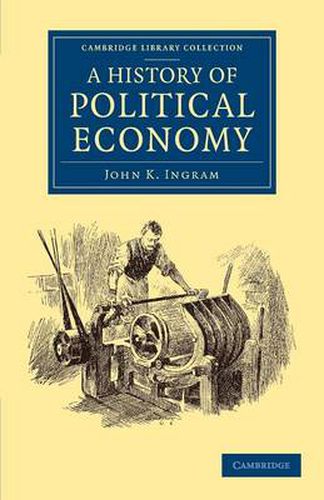Readings Newsletter
Become a Readings Member to make your shopping experience even easier.
Sign in or sign up for free!
You’re not far away from qualifying for FREE standard shipping within Australia
You’ve qualified for FREE standard shipping within Australia
The cart is loading…






Living most of his life in Dublin, John Kells Ingram (1823-1907) published papers on Shakespeare, geometry, differential calculus, and Mexican antiques, held professorial chairs in English Literature and Greek, and in 1843 wrote ‘The Memory of the Dead’, a celebrated Irish nationalist hymn. He helped to found the Dublin Statistical Society in 1847, and from the 1860s began to write papers such as ‘Work and the Workman’, reflecting his adherence to the positivist sociology of Auguste Comte. He saw economics as an integral part of sociology which, through practical application, could contribute towards the betterment of humanity. Published in 1888, A History of Political Economy was hugely successful, being translated into ten languages. In it, Ingram expands on the historicist rejection of laissez-faire and free trade as being universally correct, and promotes the notion that the state can play a constructive role in improving the lives of its people.
$9.00 standard shipping within Australia
FREE standard shipping within Australia for orders over $100.00
Express & International shipping calculated at checkout
Living most of his life in Dublin, John Kells Ingram (1823-1907) published papers on Shakespeare, geometry, differential calculus, and Mexican antiques, held professorial chairs in English Literature and Greek, and in 1843 wrote ‘The Memory of the Dead’, a celebrated Irish nationalist hymn. He helped to found the Dublin Statistical Society in 1847, and from the 1860s began to write papers such as ‘Work and the Workman’, reflecting his adherence to the positivist sociology of Auguste Comte. He saw economics as an integral part of sociology which, through practical application, could contribute towards the betterment of humanity. Published in 1888, A History of Political Economy was hugely successful, being translated into ten languages. In it, Ingram expands on the historicist rejection of laissez-faire and free trade as being universally correct, and promotes the notion that the state can play a constructive role in improving the lives of its people.